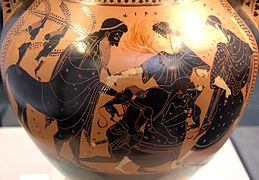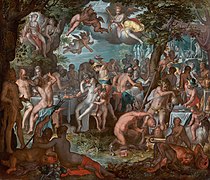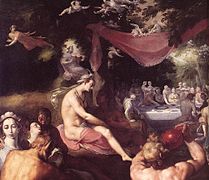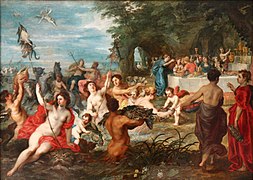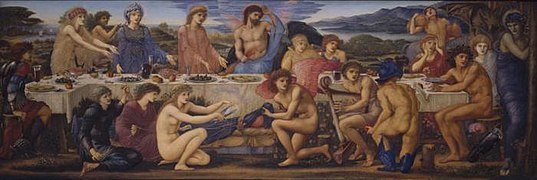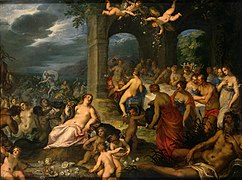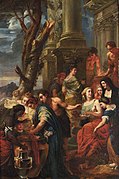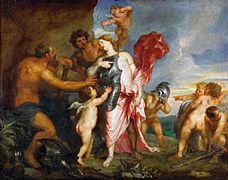Thetis: Difference between revisions
Tags: Mobile edit Mobile web edit |
m Removed erroneous space and general fixes (task 1) |
||
| (17 intermediate revisions by 10 users not shown) | |||
| Line 6: | Line 6: | ||
| name = Thetis |
| name = Thetis |
||
|member_of = the [[Nereids]] |
|member_of = the [[Nereids]] |
||
| ⚫ | |||
| ⚫ | |||
| caption = |
| caption = Statue of Thetis with a triton, Roman copy |
||
| abode = the [[Sea]] |
| abode = the [[Sea]] |
||
| parents = [[Nereus]] and [[Doris (Oceanid)|Doris]] |
| parents = [[Nereus]] and [[Doris (Oceanid)|Doris]] |
||
| Line 14: | Line 14: | ||
| children = [[Achilles]] |
| children = [[Achilles]] |
||
}} |
}} |
||
| ⚫ | |||
{{Ancient Greek religion}} |
{{Ancient Greek religion}} |
||
{{Greek myth (aquatic nymphs)}} |
{{Greek myth (aquatic nymphs)}} |
||
'''Thetis''' ({{IPAc-en|ˈ| |
'''Thetis''' ({{IPAc-en|ˈ| |
||
When described as a Nereid in Classical myths, Thetis was the daughter of [[Nereus]] and [[Doris ( |
When described as a Nereid in Classical myths, Thetis was the daughter of [[Nereus]] and [[Doris (Oceanid)|Doris]],<ref>[[Hesiod]], ''Theogony'' 240 ff.; her mother was [[Thalassa (mythology)|Thalassa]] according to [[Lucian]], ''Dialog of the Sea Gods'', 11, 2."XANTHUS:O Thalassa, take me to you; see how horribly I have been treated; cool my wounds for me.Thalassa: |
||
What is this, Xanthus? who has burned you?XANTHUS:Hephaestus. Oh, I am burned to cinders! oh, oh, oh, I boil!Thalassa:What made him use his fire upon you?XANTHUS:Why, it was all that son of your Thetis. He was slaughtering the Phrygians; I tried entreaties, but he went raging on, damming my stream with their bodies; I was so sorry for the poor wretches, I poured down to see if I could make a flood and frighten him off them. But Hephaestus happened to be about, and he must have collected every particle of fire he had in Etna or anywhere else; on he came at me, scorched my elms and tamarisks, baked the poor fishes and eels, made me boil over, and very nearly dried me up altogether. You see what a state I am in with the burns.Thalassa:Indeed you are thick and hot, Xanthus, and no wonder; the dead men's blood accounts for one, and the fire for the other, according to your story. Well, and serve you right; assaulting my grandson, indeed! paying no more respect to the son of a Nereid than that!XANTHUS:Was I not to take compassion on the Phrygians? they are my neighbours.Thalassa:And was Hephaestus not to take compassion on Achilles? He is the son of Thetis."</ref> and a granddaughter of [[Tethys (mythology)|Tethys]] with whom she sometimes shares characteristics. Often she seems to lead the Nereids as they attend to her tasks. Sometimes she also is identified with [[Metis (mythology)|Metis]]. |
What is this, Xanthus? who has burned you?XANTHUS:Hephaestus. Oh, I am burned to cinders! oh, oh, oh, I boil!Thalassa:What made him use his fire upon you?XANTHUS:Why, it was all that son of your Thetis. He was slaughtering the Phrygians; I tried entreaties, but he went raging on, damming my stream with their bodies; I was so sorry for the poor wretches, I poured down to see if I could make a flood and frighten him off them. But Hephaestus happened to be about, and he must have collected every particle of fire he had in Etna or anywhere else; on he came at me, scorched my elms and tamarisks, baked the poor fishes and eels, made me boil over, and very nearly dried me up altogether. You see what a state I am in with the burns.Thalassa:Indeed you are thick and hot, Xanthus, and no wonder; the dead men's blood accounts for one, and the fire for the other, according to your story. Well, and serve you right; assaulting my grandson, indeed! paying no more respect to the son of a Nereid than that!XANTHUS:Was I not to take compassion on the Phrygians? they are my neighbours.Thalassa:And was Hephaestus not to take compassion on Achilles? He is the son of Thetis."</ref> and a granddaughter of [[Tethys (mythology)|Tethys]] with whom she sometimes shares characteristics. Often she seems to lead the Nereids as they attend to her tasks. Sometimes she also is identified with [[Metis (mythology)|Metis]]. |
||
Some sources argue that she was one of the earliest of deities worshipped in [[Archaic Greece]], the oral traditions and records of which are lost. Only one written record, a fragment, exists attesting to her worship and an early [[Alcman]] hymn exists that identifies Thetis as the [[creator deity| |
Some sources argue that she was one of the earliest of deities worshipped in [[Archaic Greece]], the oral traditions and records of which are lost. Only one written record, a fragment, exists attesting to her worship and an early [[Alcman]] hymn exists that identifies Thetis as the [[creator deity|creator of the universe]]. Worship of Thetis as the goddess is documented to have persisted in some regions by historical writers, such as [[Pausanias (geographer)|Pausanias]]. |
||
In the [[Trojan War]] cycle of myth, the wedding of Thetis and the [[Greek hero cult|Greek hero]] [[Peleus]] is one of the precipitating events in the war which also led to the birth of their child [[Achilles]]. |
In the [[Trojan War]] cycle of myth, the wedding of Thetis and the [[Greek hero cult|Greek hero]] [[Peleus]] is one of the precipitating events in the war which also led to the birth of their child [[Achilles]]. |
||
One of her epithets was ''Halosydne'' (Ἁλοσύδνη), meaning "sea-nourished".<ref>[https://www.perseus.tufts.edu/hopper/text?doc=Perseus:text:1999.04.0104:entry=halosydne-bio-1 A Dictionary of Greek and Roman biography and mythology, Halosydne]</ref> |
One of her epithets was ''Halosydne'' ({{lang-el|Ἁλοσύδνη}}), meaning "sea-nourished" or "sea-born" goddess.<ref>[https://www.perseus.tufts.edu/hopper/text?doc=Perseus:text:1999.04.0104:entry=halosydne-bio-1 A Dictionary of Greek and Roman biography and mythology, Halosydne]</ref> |
||
== As a goddess == |
== As a goddess == |
||
Most extant material about Thetis concerns her role as mother of [[Achilles]], but there is some evidence that |
Most extant material about Thetis concerns her role as mother of [[Achilles]], but there is some evidence that she was more central to the religious beliefs and practices of [[Archaic Greece]] in her role as a sea-goddess. The pre-modern etymology of her name, from ''tithemi'' (τίθημι), "to set up, establish", suggests a perception among [[Classical Greece|Classical Greeks]] of an early [[polis|political]] role. [[Walter Burkert]]<ref>Burkert, ''The Orientalizing Revolution: Near Eastern Influence on Greek Culture in the Early Archaic Age'', 1993, pp 92-93.</ref> considers her name a transformed doublet of [[Tethys (mythology)|Tethys]]. |
||
After Achilles death, Thetis does not need to appeal to Zeus for immortality for her son, as the two have |
After Achilles' death, Thetis does not need to appeal to Zeus for immortality for her son, as the two have an established rapport (due to Thetis helping him in a dispute with three other Olympians) and snatches him away to the [[Snake Island (Ukraine)|White Island]] ''Leuke'' in the [[Black Sea]], an alternate [[Elysium]],<ref>[[Erwin Rohde]] calls the isle of Leuke a ''[[Elysium|sonderelysion]]'' in ''Psyche: Seelen Unsterblickkeitsglaube der Grieche'' (1898) 3:371, noted by Slatkin 1986:4note.</ref> where he has transcended death, and where an Achilles [[Cult (religious practice)|cult]] lingered into historical times. |
||
== Mythology == |
== Mythology == |
||
| Line 38: | Line 37: | ||
===Thetis and the other deities=== |
===Thetis and the other deities=== |
||
[[Image:Dish Thetis Peleus Louvre CA2569.jpg|thumb|Immortal Thetis with the mortal [[Peleus]] in the foreground, [[Boeotia]]n black-figure dish, c. 500–475 BC - [[Louvre]] |
[[Image:Dish Thetis Peleus Louvre CA2569.jpg|thumb|Immortal Thetis with the mortal [[Peleus]] in the foreground, [[Boeotia]]n black-figure dish, c. 500–475 BC - [[Louvre]]]] |
||
Pseudo-Apollodorus' ''[[Bibliotheca (Pseudo-Apollodorus)|Bibliotheke]]'' asserts that Thetis was courted by both [[Zeus]] and [[Poseidon]], but she was married off to the mortal [[Peleus]] because of their fears about the prophecy by [[Themis]]<ref>[[Pindar]], Eighth Isthmian Ode.</ref> (or [[Prometheus]], or [[Calchas]], according to others) that her son would become greater than his father. Thus, she is revealed as a figure of cosmic capacity, quite capable of unsettling the divine order. (Slatkin 1986:12) |
Pseudo-Apollodorus' ''[[Bibliotheca (Pseudo-Apollodorus)|Bibliotheke]]'' asserts that Thetis was courted by both [[Zeus]] and [[Poseidon]], but she was married off to the mortal [[Peleus]] because of their fears about the prophecy by [[Themis]]<ref>[[Pindar]], Eighth Isthmian Ode.</ref> (or [[Prometheus]], or [[Calchas]], according to others) that her son would become greater than his father. Thus, she is revealed as a figure of cosmic capacity, quite capable of unsettling the divine order. (Slatkin 1986:12) |
||
When [[Hephaestus]] was thrown from Olympus, whether cast out by Hera for his lameness or evicted by [[Zeus]] for taking Hera's side, the [[Oceanid]] Eurynome and the [[Nereid]] Thetis caught him and allowed him to stay on the volcanic isle of [[Lemnos]], while he labored for them as a smith, "working there in the hollow of the cave, and the stream of [[Oceanus|Okeanos]] around us went on forever with its foam and its murmur" (''Iliad'' 18.369). |
When [[Hephaestus]] was thrown from Olympus, whether cast out by Hera for his lameness or evicted by [[Zeus]] for taking Hera's side, the [[Oceanids|Oceanid]] Eurynome and the [[Nereids|Nereid]] Thetis caught him and allowed him to stay on the volcanic isle of [[Lemnos]], while he labored for them as a smith, "working there in the hollow of the cave, and the stream of [[Oceanus|Okeanos]] around us went on forever with its foam and its murmur" (''Iliad'' 18.369). |
||
Thetis is not successful in her role protecting and nurturing a hero (the theme of ''[[kourotrophos]]''), but her role in succoring deities is emphatically repeated by Homer. Diomedes recalls that when Dionysus was expelled by [[Lycurgus of Thrace|Lycurgus]] with the Olympians' aid, he took refuge in the [[Red Sea|Erythraean Sea]] with Thetis in a bed of [[seaweed]] (6.123ff). These accounts associate Thetis with "a divine past—uninvolved with human events—with a level of divine invulnerability extraordinary by Olympian standards. Where within the framework of the ''Iliad'' the ultimate recourse is to Zeus for protection, here the poem seems to point to an alternative structure of cosmic relations."<ref>Slatkin 1986:10.</ref> |
Thetis is not successful in her role protecting and nurturing a hero (the theme of ''[[kourotrophos]]''), but her role in succoring deities is emphatically repeated by Homer. Diomedes recalls that when Dionysus was expelled by [[Lycurgus of Thrace|Lycurgus]] with the Olympians' aid, he took refuge in the [[Red Sea|Erythraean Sea]] with Thetis in a bed of [[seaweed]] (6.123ff). These accounts associate Thetis with "a divine past—uninvolved with human events—with a level of divine invulnerability extraordinary by Olympian standards. Where within the framework of the ''Iliad'' the ultimate recourse is to Zeus for protection, here the poem seems to point to an alternative structure of cosmic relations."<ref>Slatkin 1986:10.</ref> |
||
Once, Thetis and [[Medea]] argued in [[Thessaly]] over which was the most beautiful; they appointed the Cretan [[Idomeneus]] as the judge, who gave the victory to Thetis. In her anger, Medea called all [[Crete|Cretans]] liars, and cursed them to never say the truth.<ref>[[Ptolemaeus Chennus]], ''New History'' Book 5, as epitomized by [[Photius I of Constantinople|Patriarch Photius]] in ''[[Bibliotheca (Photius)|Myriobiblon]]'' [https://topostext.org/work/237#190.36 190.36]</ref> |
Once, Thetis and [[Medea]] argued in [[Thessaly]] over which was the most beautiful; they appointed the Cretan [[Idomeneus of Crete|Idomeneus]] as the judge, who gave the victory to Thetis. In her anger, Medea called all [[Crete|Cretans]] liars, and cursed them to never say the truth.<ref>[[Ptolemaeus Chennus]], ''New History'' Book 5, as epitomized by [[Photius I of Constantinople|Patriarch Photius]] in ''[[Bibliotheca (Photius)|Myriobiblon]]'' [https://topostext.org/work/237#190.36 190.36]</ref> |
||
===Marriage to Peleus=== |
===Marriage to Peleus=== |
||
[[File:Thetis Peleus Cdm Paris 539.jpg|thumb|''Thetis changing into a lioness as she is attacked by Peleus'', Attic red-figured kylix by [[Douris (vase painter)|Douris]], c. 490 BC from Vulci, Etruria - ''[[Bibliothèque |
[[File:Thetis Peleus Cdm Paris 539.jpg|thumb|''Thetis changing into a lioness as she is attacked by Peleus'', Attic red-figured kylix by [[Douris (vase painter)|Douris]], c. 490 BC from Vulci, Etruria - ''[[Bibliothèque nationale de France]]'' in Paris|left]] |
||
{{main|Judgement of Paris}} |
{{main|Judgement of Paris}} |
||
| Line 56: | Line 55: | ||
[[Proteus]], an early sea-god, advised Peleus to find the sea nymph when she was asleep and bind her tightly to keep her from escaping by changing forms. She did shapeshift, becoming flame, water, a raging [[lion]]ess, and a [[Serpent symbolism|serpent]].<ref>Ovid:Metamorphoses xi, 221ff.; Sophocles: Troilus, quoted by scholiast on Pindar's Nemean Odes iii. 35; Apollodorus: iii, 13.5; Pindar: Nemean Odes iv .62; Pausanias: v.18.1</ref> Peleus held fast. Subdued, she then consented to marry him. Thetis is the mother of [[Achilles]] by [[Peleus]], who became king of the [[Myrmidons]]. |
[[Proteus]], an early sea-god, advised Peleus to find the sea nymph when she was asleep and bind her tightly to keep her from escaping by changing forms. She did shapeshift, becoming flame, water, a raging [[lion]]ess, and a [[Serpent symbolism|serpent]].<ref>Ovid:Metamorphoses xi, 221ff.; Sophocles: Troilus, quoted by scholiast on Pindar's Nemean Odes iii. 35; Apollodorus: iii, 13.5; Pindar: Nemean Odes iv .62; Pausanias: v.18.1</ref> Peleus held fast. Subdued, she then consented to marry him. Thetis is the mother of [[Achilles]] by [[Peleus]], who became king of the [[Myrmidons]]. |
||
According to classical mythology, the wedding of Thetis and Peleus was celebrated on Mount [[Pelion]], outside the cave of [[Chiron]], and attended by the deities: there they celebrated the marriage with feasting. Apollo played the lyre and the [[Muses]] sang, [[Pindar]] claimed. At the wedding Chiron gave Peleus an ashen spear that had been polished by [[Athena]] and had a blade forged by Hephaestus. While the Olympian goddesses brought him gifts: from [[Aphrodite]], a bowl with an embossed [[Eros]], from Hera a [[chlamys]] while from Athena a flute. His father-in-law Nereus endowed him a basket of the salt called 'divine', which has an irresistible virtue for overeating, appetite and digestion, explaining the expression ''<nowiki/>'...she poured the divine salt'''. Zeus then bestowed the wings of [[Arke |
According to classical mythology, the wedding of Thetis and Peleus was celebrated on Mount [[Pelion]], outside the cave of [[Chiron]], and attended by the deities: there they celebrated the marriage with feasting. Apollo played the lyre and the [[Muses]] sang, [[Pindar]] claimed. At the wedding Chiron gave Peleus an ashen spear that had been polished by [[Athena]] and had a blade forged by Hephaestus. While the Olympian goddesses brought him gifts: from [[Aphrodite]], a bowl with an embossed [[Eros]], from Hera a [[chlamys]] while from Athena a flute. His father-in-law Nereus endowed him a basket of the salt called 'divine', which has an irresistible virtue for overeating, appetite and digestion, explaining the expression ''<nowiki/>'...she poured the divine salt'''. Zeus then bestowed the wings of [[Arke|Arce]] to the newly-wed couple which was later given by Thetis to her son, Achilles. Furthermore, the god of the sea, Poseidon gave Peleus the immortal horses, [[Balius and Xanthus]].<ref>Photius, ''Bibliotheca 190.46.'' Translated by John Henry Freese, from the SPCK edition of 1920, now in the public domain, and other brief excerpts from subsequent sections translated by Roger Pearse (from the French translation by Rene Henry, ed. Les Belles Lettres)</ref> [[Eris (mythology)|Eris]], the goddess of discord, had not been invited, however, and in spite, she threw a golden apple into the midst of the goddesses that was to be awarded only "to the fairest." In most interpretations, the award was made during the [[Judgement of Paris]] and eventually occasioned the [[Trojan War]]. |
||
[[File:Peter Paul Rubens 181.jpg|thumb|left|''Thetis dips Achilles in the Styx'' by Peter Paul Rubens (between 1630 and 1635)]] |
[[File:Peter Paul Rubens 181.jpg|thumb|left|''Thetis dips Achilles in the Styx'' by Peter Paul Rubens (between 1630 and 1635)]] |
||
| Line 63: | Line 62: | ||
<blockquote>Thetis heard him, and catching up the child threw him screaming to the ground, and she like a breath of wind passed swiftly from the hall as a dream and leapt into the sea, exceeding angry, and thereafter returned never again.</blockquote> |
<blockquote>Thetis heard him, and catching up the child threw him screaming to the ground, and she like a breath of wind passed swiftly from the hall as a dream and leapt into the sea, exceeding angry, and thereafter returned never again.</blockquote> |
||
Some myths relate that because she had been interrupted by Peleus, Thetis had not made her son physically invulnerable. His heel, which she was about to burn away when her husband stopped her, had not been protected. (A similar myth of immortalizing a child in fire is seen in the case of [[Demeter]] and the infant [[Demophon of |
Some myths relate that because she had been interrupted by [[Peleus]], Thetis had not made her son physically invulnerable. His heel, which she was about to burn away when her husband stopped her, had not been protected. (A similar myth of immortalizing a child in fire is seen in the case of [[Demeter]] and the infant [[Demophon (son of Celeus)|Demophoon]]). In a variant of the myth first recounted in the ''[[Achilleid]]'', an unfinished epic written between 94–95 AD by the Roman poet [[Statius]], Thetis tried to make Achilles invulnerable by dipping him in the [[Styx|River Styx]] (one of the five rivers that run through [[Hades]], the realm of the dead). However, the heel by which she held him was not touched by the Styx's waters and failed to be protected. |
||
Peleus gave the boy to [[Chiron]] to raise. Prophecy said that the son of Thetis would have either a long but dull life, or a glorious but brief one. When the Trojan War broke out, Thetis was anxious and concealed Achilles, disguised as a girl, at the court of [[Lycomedes]], king of |
Peleus gave the boy to [[Chiron]] to raise. Prophecy said that the son of Thetis would have either a long but dull life, or a glorious but brief one. When the Trojan War broke out, Thetis was anxious and concealed Achilles, disguised as a girl, at the court of [[Lycomedes of Scyros|Lycomedes]], king of Scyros. Achilles was already famed for his speed and skill in battle. [[Calchas]], a priest of Agamemnon, prophesied the need for the great soldier within their ranks. Odysseus was subsequently sent by Agamemnon to try and find Achilles. Scyros was relatively close to Achilles’ home and Lycomedes was also a known friend of Thetis, so it was one of the first places that Odysseus looked. When Odysseus found that one of the girls at court was not a girl, he came up with a plan. Raising an alarm that they were under attack, Odysseus knew that the young Achilles would instinctively run for his weapons and armour, thereby revealing himself. Seeing that she could no longer prevent her son from realizing his destiny, Thetis then had [[Hephaestus]] make a shield and armor. |
||
[[File:Wall painting - Hephaistos producing the new arms for Achilles - Pompeii (IX 1 7) - Napoli MAN 9529.jpg|thumb|Thetis at Hephaestus' forge waiting to receive Achilles' new weapons. Fresco from [[Pompeii]] |
[[File:Wall painting - Hephaistos producing the new arms for Achilles - Pompeii (IX 1 7) - Napoli MAN 9529.jpg|thumb|Thetis at Hephaestus' forge waiting to receive Achilles' new weapons. Fresco from [[Pompeii]]]] |
||
===Iliad and the Trojan War=== |
===Iliad and the Trojan War=== |
||
[[Image:Hydria Achilles weapons Louvre E869.jpg|thumb|Thetis and attendants bring armor she had prepared for him to [[Achilles]], an Attic black-figure hydria, c. 575–550 BC, [[Louvre]] |
[[Image:Hydria Achilles weapons Louvre E869.jpg|thumb|Thetis and attendants bring armor she had prepared for him to [[Achilles]], an Attic black-figure hydria, c. 575–550 BC, [[Louvre]]|left]] |
||
Thetis played a key part in the events of the Trojan War. Beyond the fact that the [[Judgement of Paris]], which |
Thetis played a key part in the events of the Trojan War. Beyond the fact that the [[Judgement of Paris]], which kicked off the war, occurred at her wedding to [[Peleus]], Thetis consistently influenced the actions of the [[Twelve Olympians]] and her son, [[Achilles]].[[Image:Júpiter y Tetis, por Dominique Ingres.jpg|thumb|''[[Jupiter and Thetis]]'', [[Jean-Auguste-Dominique Ingres|Ingres]]: "She sank to the ground beside him, put her left arm round his knees, raised her right hand to touch his chin, and so made her petition to the [[Zeus|Royal Son of Cronos]]" (''[[Iliad]]'', I)]] |
||
Nine years after the beginning of the Trojan War, Homer's ''[[Iliad]]'' starts with [[Agamemnon]] (king of Mycenae and the commander of the [[Achaeans (Homer)|Achaeans]]) and Achilles (son of Thetis) arguing over [[Briseis]], a woman married to [[Mynes (mythology)|Mynes]] (son of the king of [[Lyrnessus]]). She was kidnapped and enslaved by Achilles. After initially refusing, Achilles relents and gives Briseis to Agamemnon. However, Achilles feels disrespect for having to hand over Briseis and prays to Thetis, his mother, for restitution of his lost honor.<ref>{{Cite book|title = The Iliad of Homer|last = Lattimore|first = Richmond|publisher = University Of Chicago Press|year = 2011|isbn = 978-0226470498|location = Chicago, IL|pages = 59–70}}</ref> She urges Achilles to wait until she speaks with [[Zeus]] to rejoin the fighting, and Achilles listens.<ref>{{cite book|last1=introduction|first1=Homer ; translated by Robert Fagles|last2=Knox|first2=notes by Bernard|title=The Iliad|date=2001|publisher=Penguin Books|location=New York, N.Y.|isbn=0140275363|page=[https://archive.org/details/iliad00home_3/page/91 91]|edition=[Repr. with revisions].|url=https://archive.org/details/iliad00home_3/page/91}}</ref> When she finally speaks to Zeus, Thetis convinces him to do as she bids, and he seals his agreement with her by bowing his head, the strongest oath that he can make.<ref>{{cite book|last1=introduction|first1=Homer ; translated by Robert Fagles|last2=Knox|first2=notes by Bernard|title=The Iliad|date=2001|publisher=Penguin Books|location=New York, N.Y.|isbn=0140275363|page=[https://archive.org/details/iliad00home_3/page/95 95]|edition=[Repr. with revisions].|url=https://archive.org/details/iliad00home_3/page/95}}</ref> |
|||
Following the death of Patroclus, who wore Achilles' armor in the fighting, Thetis comes to Achilles to console him in his grief. She vows to return to him with armor forged by [[Hephaestus]], the blacksmith of the gods, and tells him not to arm himself for battle until he sees her coming back. While Thetis is gone, Achilles is visited by [[Iris (mythology)|Iris]], the messenger of the gods, sent by [[Hera]], who tells him to rejoin the fighting. He refuses, however, citing his mother's words and his promise to her to wait for her return.<ref>{{cite book|last1=introduction|first1=Homer ; translated by Robert Fagles|last2=Knox|first2=notes by Bernard|title=The Iliad|date=2001|publisher=Penguin Books|location=New York, N.Y.|isbn=0140275363|pages=[https://archive.org/details/iliad00home_3/page/472 472–474]|edition=[Repr. with revisions].|url=https://archive.org/details/iliad00home_3/page/472}}</ref> Thetis, meanwhile, speaks with Hephaestus and begs him to make Achilles armor, which he does. First, he makes for Achilles a splendid [[Shield of Achilles|shield]], and having finished it, makes a breastplate, a helmet, and greaves.<ref>{{cite book|last1=introduction|first1=Homer ; translated by Robert Fagles|last2=Knox|first2=notes by Bernard|title=The Iliad|date=2001|publisher=Penguin Books|location=New York, N.Y.|isbn=0140275363|pages=[https://archive.org/details/iliad00home_3/page/480 480–487]|edition=[Repr. with revisions].|url=https://archive.org/details/iliad00home_3/page/480}}</ref> When Thetis goes back to Achilles to deliver his new armor, she finds him still upset over Patroclus. Achilles fears that while he is off fighting the Trojans, Patroclus' body will decay and rot. Thetis, however, reassures him and places ambrosia and nectar in Patroclus' nose in order to protect his body against decay.<ref>{{cite book|last1=introduction|first1=Homer ; translated by Robert Fagles|last2=Knox|first2=notes by Bernard|title=The Iliad|date=2001|publisher=Penguin Books|location=New York, N.Y.|isbn=0140275363|page=[https://archive.org/details/iliad00home_3/page/489 489]|edition=[Repr. with revisions].|url=https://archive.org/details/iliad00home_3/page/489}}</ref> |
Following the death of Patroclus, who wore Achilles' armor in the fighting, Thetis comes to Achilles to console him in his grief. She vows to return to him with armor forged by [[Hephaestus]], the blacksmith of the gods, and tells him not to arm himself for battle until he sees her coming back. While Thetis is gone, Achilles is visited by [[Iris (mythology)|Iris]], the messenger of the gods, sent by [[Hera]], who tells him to rejoin the fighting. He refuses, however, citing his mother's words and his promise to her to wait for her return.<ref>{{cite book|last1=introduction|first1=Homer ; translated by Robert Fagles|last2=Knox|first2=notes by Bernard|title=The Iliad|date=2001|publisher=Penguin Books|location=New York, N.Y.|isbn=0140275363|pages=[https://archive.org/details/iliad00home_3/page/472 472–474]|edition=[Repr. with revisions].|url=https://archive.org/details/iliad00home_3/page/472}}</ref> Thetis, meanwhile, speaks with Hephaestus and begs him to make Achilles armor, which he does. First, he makes for Achilles a splendid [[Shield of Achilles|shield]], and having finished it, makes a breastplate, a helmet, and greaves.<ref>{{cite book|last1=introduction|first1=Homer ; translated by Robert Fagles|last2=Knox|first2=notes by Bernard|title=The Iliad|date=2001|publisher=Penguin Books|location=New York, N.Y.|isbn=0140275363|pages=[https://archive.org/details/iliad00home_3/page/480 480–487]|edition=[Repr. with revisions].|url=https://archive.org/details/iliad00home_3/page/480}}</ref> When Thetis goes back to Achilles to deliver his new armor, she finds him still upset over Patroclus. Achilles fears that while he is off fighting the Trojans, Patroclus' body will decay and rot. Thetis, however, reassures him and places ambrosia and nectar in Patroclus' nose in order to protect his body against decay.<ref>{{cite book|last1=introduction|first1=Homer ; translated by Robert Fagles|last2=Knox|first2=notes by Bernard|title=The Iliad|date=2001|publisher=Penguin Books|location=New York, N.Y.|isbn=0140275363|page=[https://archive.org/details/iliad00home_3/page/489 489]|edition=[Repr. with revisions].|url=https://archive.org/details/iliad00home_3/page/489}}</ref> |
||
| Line 77: | Line 78: | ||
==Worship in Laconia and other places== |
==Worship in Laconia and other places== |
||
[[Image:Mourning of Akhilleus Louvre E643.jpg|thumb|left|Thetis and the [[Nereid]]s mourning Achilles, Corinthian black-figure hydria, 560–550 BC; note the [[Gorgon]] shield, [[Louvre]]]] |
[[Image:Mourning of Akhilleus Louvre E643.jpg|thumb|left|Thetis and the [[Nereid]]s mourning Achilles, Corinthian black-figure hydria, 560–550 BC; note the [[Gorgons|Gorgon]] shield, [[Louvre]]]] |
||
| ⚫ | A noted exception to the general observation resulting from the existing historical records, that Thetis was not venerated as a goddess by cult, was in [[Conservatism|conservative]] [[Laconia]], where [[Pausanias (geographer)|Pausanias]] was informed that there had been [[priest]]esses of Thetis in archaic times, when a cult that was centered on a wooden [[cult image]] of Thetis (a ''[[xoanon]]''), which preceded the building of the oldest temple; by the intervention of a highly placed woman, her cult had been re-founded with a temple; and in the second century AD she still was being worshipped with utmost reverence. The [[Sparta|Lacedaemonians]] were at war with the [[Messenia (ancient region)|Messenians]], who had revolted, and their king Anaxander, having invaded Messenia, took as prisoners certain women, and among them Cleo, priestess of Thetis. The wife of Anaxander asked for this Cleo from her husband, and discovering that she had the wooden image of Thetis, she set up the woman Cleo in a temple for the goddess. This Leandris did because of a [[vision (spirituality)|vision]] in a dream, but the wooden image of Thetis is guarded in secret.<ref>Pausanias, ''Description of Greece'' 3.14.4–5</ref> |
||
| ⚫ | In one fragmentary [[hymn]]<ref>The papyrus fragment was found at [[Oxyrhynchus]].</ref> by the seventh-century BC [[Sparta]]n poet [[Alcman]], Thetis appears as a [[demiurge]], beginning her creation with ''poros'' (πόρος) "path, track" and ''tekmor'' (τέκμωρ) "marker, end-post". Third was ''skotos'' (σκότος) "darkness", and then the [[Sun]] and the [[Moon]]. A close connection has been argued between Thetis and [[Metis (mythology)|Metis]], another [[Shapeshifting|shape-shifting]] sea-power later beloved by Zeus. but prophesied-bound to produce a son greater than his father because of her great strength.<ref>M. Detienne and J.-P. Vernant, ''Les Ruses de l'intelligence: la métis des Grecs'' (Paris, 1974) pp. 127–64, noted in Slatkin 1986:14note.</ref> |
||
| ⚫ | A noted exception to the general observation resulting from the existing historical records, that Thetis was not venerated as a goddess by cult, was in [[conservative]] [[Laconia]], where [[Pausanias (geographer)|Pausanias]] was informed that there had been [[priest]]esses of Thetis in archaic times, when a cult that was centered on a wooden [[cult image]] of Thetis (a ''[[xoanon]]''), which preceded the building of the oldest temple; by the intervention of a highly placed woman, her cult had been re-founded with a temple; and in the second century AD she still was being worshipped with utmost reverence. The [[Lacedaemonians]] were at war with the [[Messenians]], who had revolted, and their king Anaxander, having invaded Messenia, took as prisoners certain women, and among them Cleo, priestess of Thetis. The wife of Anaxander asked for this Cleo from her husband, and discovering that she had the wooden image of Thetis, she set up the woman Cleo in a temple for the goddess. This Leandris did because of a [[vision (spirituality)|vision]] in a dream, but the wooden image of Thetis is guarded in secret.<ref>Pausanias, ''Description of Greece'' 3.14.4–5</ref> |
||
| ⚫ | [[Herodotus]] noted that the [[Persians]] sacrificed to "Thetis" at Cape Sepias. By the process of ''[[interpretatio graeca]]'', Herodotus identifies a sea-goddess of another culture (probably [[Anahita]]) as the familiar Hellenic "Thetis".<ref>[[Herodotus]], ''[[Histories (Herodotus)|Histories]]'' [http://www.perseus.tufts.edu/hopper/text?doc=Perseus%3Atext%3A1999.01.0126%3Abook%3D7%3Achapter%3D191%3Asection%3D2 7.191.2].</ref> |
||
| ⚫ | In one fragmentary hymn |
||
[[File:20230605 122935 Eleutherna MaE.jpg|thumb|center|upright=2|Ivory plaque depicting Thetis birthing and dipping Achilles in Styx, 4th century AD, from [[Eleutherna]] in [[Crete]]]] |
|||
| ⚫ | [[Herodotus]] noted that the [[ |
||
==In other works== |
==In other works== |
||
[[File:CSA-T22-$10-1861–62.jpg|thumb|Thetis depicted (left) on a CSA [[Confederate States dollar|$10 bill]] in 1861–62 |
[[File:CSA-T22-$10-1861–62.jpg|thumb|Thetis depicted (left) on a CSA [[Confederate States dollar|$10 bill]] in 1861–62]] |
||
* [[Homer]]'s ''[[Iliad]]'' makes many references to Thetis. |
* [[Homer]]'s ''[[Iliad]]'' makes many references to Thetis. |
||
* [[Euripides]]'s ''[[Andromache (play)|Andromache]],'' 1232–1272 |
* [[Euripides]]'s ''[[Andromache (play)|Andromache]],'' 1232–1272. |
||
* [[Apollonius Rhodius]], ''[[Argonautica]]'' IV, 770–879. |
* [[Apollonius of Rhodes|Apollonius Rhodius]], ''[[Argonautica]]'' IV, 770–879. |
||
* ''[[Bibliotheca (Pseudo-Apollodorus)|Bibliotheca]]'' 3.13.5. |
* ''[[Bibliotheca (Pseudo-Apollodorus)|Bibliotheca]]'' 3.13.5. |
||
* [[Francesco Cavalli]]'s first opera ''[[Le nozze di Teti e di Peleo]]'', composed in 1639, concerned the marriage of Thetis and Peleus |
* [[Francesco Cavalli]]'s first opera ''[[Le nozze di Teti e di Peleo]]'', composed in 1639, concerned the marriage of Thetis and [[Peleus]]. |
||
* [[W. H. Auden|WH Auden]]'s poem [[The Shield of Achilles]] imagines Thetis's witnessing of the forging of [[Achilles]]'s shield. |
* [[W. H. Auden|WH Auden]]'s poem [[The Shield of Achilles]] imagines Thetis's witnessing of the forging of [[Achilles]]'s shield. |
||
* In 1939, [[HMS Thetis (N25)]] then a new design of submarine, sank on her trials in the River Mersey shortly after she left the dock in Liverpool. There were 103 people on board and 99 died. The cause of the accident was an inspection hole to allow a sailor to look into the torpedo |
* In 1939, [[HMS Thetis (N25)]] then a new design of submarine, sank on her trials in the River Mersey shortly after she left the dock in [[Liverpool]]. There were 103 people on board and 99 died. The cause of the accident was an inspection hole to allow a [[sailor]] to look into the [[torpedo tube]]s. A special closure for this inspection hole had been painted over. Once submerged the torpedo tube flooded and the bow of the vessel sank. The stern was still above water. Ninety-nine people, half of them dockyard workers, died of [[carbon monoxide poisoning]]. |
||
* In 1981, British actress [[Maggie Smith]] portrayed Thetis in the [[Ray Harryhausen]] film ''[[Clash of the Titans (1981 film)|Clash of the Titans]]'' (for which she won a [[Saturn Award]]). In the film, she acts as the main antagonist to the hero [[Perseus]] for the mistreatment of her son Calibos. |
* In 1981, British actress [[Maggie Smith]] portrayed Thetis in the [[Ray Harryhausen]] film ''[[Clash of the Titans (1981 film)|Clash of the Titans]]'' (for which she won a [[Saturn Awards|Saturn Award]]). In the film, she acts as the main antagonist to the hero [[Perseus]] for the mistreatment of her son Calibos. |
||
* In 1999, British poet [[Carol Ann Duffy]] published ''[[The World's Wife]]'' poetry collection, which included a poem based on Thetis. |
* In 1999, British poet [[Carol Ann Duffy]] published ''[[The World's Wife]]'' poetry collection, which included a poem based on Thetis. |
||
* In 2004, British actress [[Julie Christie]] portrayed Thetis in the [[Wolfgang Petersen]] film ''[[Troy (film)|Troy]]'' |
* In 2004, British actress [[Julie Christie]] portrayed Thetis in the [[Wolfgang Petersen]] film ''[[Troy (film)|Troy]].'' |
||
* In 2011, American novelist [[Madeline Miller]] portrayed Thetis in ''The Song of Achilles'' as a harsh and remote deity. She does not approve of Patroclus and tries to separate him and Achilles on multiple occasions. |
* In 2011, American novelist [[Madeline Miller]] portrayed Thetis in ''[[The Song of Achilles]]'' as a harsh and remote deity. She does not approve of Patroclus and tries to separate him and Achilles on multiple occasions. |
||
* The 2018 novel ''[[The Silence of the Girls]]'' focuses on the character of Briseis in the first person, with interjections giving Achilles' internal state of mind, including his tormented relationship with his mother. |
* The 2018 novel ''[[The Silence of the Girls]]'' focuses on the character of Briseis in the first person, with interjections giving Achilles' internal state of mind, including his tormented relationship with his mother. |
||
* In 2019, New Zealand graphic designer |
* In 2019, New Zealand [[graphic designer]] Rachel Smythe portrayed Thetis in "[[Lore Olympus]]". She is Zeus' personal secretary whom she also has an affair with. She is also the toxic best friend of [[Minthe]] and works with her to bring down [[Persephone]]. |
||
== Gallery == |
== Gallery == |
||
| Line 106: | Line 109: | ||
=== Thetis, Peleus and Zeus === |
=== Thetis, Peleus and Zeus === |
||
<gallery mode="packed-hover"> |
<gallery mode="packed-hover"> |
||
File:Thetis by William Henry Rinehart.JPG |
File:Thetis by William Henry Rinehart.JPG |
||
File:Thetis Peleus Louvre G373.jpg |
File:Thetis Peleus Louvre G373.jpg |
||
File:Thetis Peleus Louvre G65.jpg |
File:Thetis Peleus Louvre G65.jpg |
||
File:Peleus Thetis Staatliche Antikensammlungen 1415.jpg |
File:Peleus Thetis Staatliche Antikensammlungen 1415.jpg |
||
File:Peleus Thetis Staatliche Antikensammlungen Schoen64.jpg |
File:Peleus Thetis Staatliche Antikensammlungen Schoen64.jpg |
||
File:Kylix by Peithinos - Altes Museum Berlin.JPG |
File:Kylix by Peithinos - Altes Museum Berlin.JPG |
||
File:Pyxis Peleus Thetis Louvre L55 by Wedding Painter.jpg |
File:Pyxis Peleus Thetis Louvre L55 by Wedding Painter.jpg |
||
File:Thetis and Zeus by A.Losenko.jpg |
File:Thetis and Zeus by A.Losenko.jpg |
||
| ⚫ | |||
| ⚫ | |||
| ⚫ | |||
</gallery> |
</gallery> |
||
=== Wedding of Peleus and Thetis === |
=== Wedding of Peleus and Thetis === |
||
<gallery mode="packed-hover"> |
<gallery mode="packed-hover"> |
||
File:The wedding of Peleus and Thetis, by Joachim Wtewael.jpg |
File:The wedding of Peleus and Thetis, by Joachim Wtewael.jpg |
||
File:The Wedding of Peleus and Thetis by Peter Paul Rubens.jpg |
File:The Wedding of Peleus and Thetis by Peter Paul Rubens.jpg |
||
File:Gillis van Valckenborch - The marriage of Peleus and Thetis.jpg |
File:Gillis van Valckenborch - The marriage of Peleus and Thetis.jpg |
||
File:WLANL - legalizefreedom - De bruiloft van Peleus en Thetis.jpg |
File:WLANL - legalizefreedom - De bruiloft van Peleus en Thetis.jpg |
||
File:The feast of the gods at the wedding of Peleus and Thetis.jpg |
File:The feast of the gods at the wedding of Peleus and Thetis.jpg |
||
File:Hans Rottenhammer - Götterfest, Hochzeit von Peleus und Thetis (Ermitage).jpg |
File:Hans Rottenhammer - Götterfest, Hochzeit von Peleus und Thetis (Ermitage).jpg |
||
File:1715 Elliger Hochzeit von Peleus und Thetis anagoria.JPG |
File:1715 Elliger Hochzeit von Peleus und Thetis anagoria.JPG |
||
File:WeddingPeleusThetisWtewael.jpg |
File:WeddingPeleusThetisWtewael.jpg |
||
File:Jan van Balen (attr.) - The Marriage Feast of Peleus and Thetis.jpg |
File:Jan van Balen (attr.) - The Marriage Feast of Peleus and Thetis.jpg |
||
File:PeleusThetisWtewael2.jpg |
File:PeleusThetisWtewael2.jpg |
||
File:Golden Apple of Discord by Jacob Jordaens.jpg |
File:Golden Apple of Discord by Jacob Jordaens.jpg |
||
File:The Wedding Feast of Peleus and Thetis LACMA M.88.91.100.jpg |
File:The Wedding Feast of Peleus and Thetis LACMA M.88.91.100.jpg |
||
File:Jan Brueghel and Hendrick van Balen - The Marriage of the Goddess of the Sea, Thetis, and King Peleus, 1610.jpg |
File:Jan Brueghel and Hendrick van Balen - The Marriage of the Goddess of the Sea, Thetis, and King Peleus, 1610.jpg |
||
File:Cornelis Cornelisz. van Haarlem - The Wedding of Peleus and Thetis (detail) - WGA05246.jpg |
File:Cornelis Cornelisz. van Haarlem - The Wedding of Peleus and Thetis (detail) - WGA05246.jpg |
||
File:Cornelis Cornelisz. van Haarlem - The Wedding of Peleus and Thetis (detail) - WGA05245.jpg |
File:Cornelis Cornelisz. van Haarlem - The Wedding of Peleus and Thetis (detail) - WGA05245.jpg |
||
File:The Marriage of Peleus by Mazzola.jpg |
File:The Marriage of Peleus by Mazzola.jpg |
||
File:Hendrick van Balen-Les noces de Thétis et Pêlée.jpg |
File:Hendrick van Balen-Les noces de Thétis et Pêlée.jpg |
||
File:The Feast of Peleus - Edward Burne-Jones.jpg |
File:The Feast of Peleus - Edward Burne-Jones.jpg |
||
File:Agostino Carracci, Teti e Peleo, Palazzo del Giardino, Parma.jpg |
File:Agostino Carracci, Teti e Peleo, Palazzo del Giardino, Parma.jpg |
||
File:Giovanni - Noces de Thétis et Pelée, Louvre RF 1346.jpg |
File:Giovanni - Noces de Thétis et Pelée, Louvre RF 1346.jpg |
||
File:Risdm-62-058Wtewael.jpg |
File:Risdm-62-058Wtewael.jpg |
||
File:Mythologisches Gastmahl flämisch 17Jh.jpg |
File:Mythologisches Gastmahl flämisch 17Jh.jpg |
||
File:Hans Rottenhammer 001.jpg |
File:Hans Rottenhammer 001.jpg |
||
File:Cornelis Cornelisz. van Haarlem - Massacre of the Innocents - WGA05256.jpg |
File:Cornelis Cornelisz. van Haarlem - Massacre of the Innocents - WGA05256.jpg |
||
File:Jan Erasmus Quellinus - Thetis Dips Achilles in a Vase with Water from the Styx - WGA18567.jpg |
File:Jan Erasmus Quellinus - Thetis Dips Achilles in a Vase with Water from the Styx - WGA18567.jpg |
||
File:Van Balen and Brueghel, The Wedding of Thétis and Pélée-cropped white-balanced.png |
File:Van Balen and Brueghel, The Wedding of Thétis and Pélée-cropped white-balanced.png |
||
</gallery> |
</gallery> |
||
=== Thetis and Achilles === |
=== Thetis and Achilles === |
||
<gallery mode="packed-hover"> |
<gallery mode="packed-hover"> |
||
File:Thetis dipping Achilles in the River Styx by Thomas Banks 02.jpg |
File:Thetis dipping Achilles in the River Styx by Thomas Banks 02.jpg |
||
File:Thetis dipping Achilles into the River Styx by Donato Creti.jpg |
File:Thetis dipping Achilles into the River Styx by Donato Creti.jpg |
||
File:Thetis Immerses Son Achilles in Water of River Styx by Antoine Borel.jpg |
File:Thetis Immerses Son Achilles in Water of River Styx by Antoine Borel.jpg |
||
File:Jan Erasmus Quellinus - Thetis Dips Achilles in a Vase with Water from the Styx - WGA18567.jpg |
File:Jan Erasmus Quellinus - Thetis Dips Achilles in a Vase with Water from the Styx - WGA18567.jpg |
||
File:Johann Balthasar Probst 004.jpg |
File:Johann Balthasar Probst 004.jpg |
||
File:Johann Balthasar Probst 003.jpg |
File:Johann Balthasar Probst 003.jpg |
||
File:Johann Balthasar Probst 001.jpg |
File:Johann Balthasar Probst 001.jpg |
||
File:Thetis Giving Achilles His Arms.jpg |
File:Thetis Giving Achilles His Arms.jpg |
||
File:Johann Balthasar Probst 007.jpg |
File:Johann Balthasar Probst 007.jpg |
||
File:Peter Paul Rubens 177.jpg |
File:Peter Paul Rubens 177.jpg |
||
File:Anthonis van Dyck 066.jpg |
File:Anthonis van Dyck 066.jpg |
||
File:Pompeo Batoni - Teti richiama Achille dal Centauro Chirone (1770).jpg |
File:Pompeo Batoni - Teti richiama Achille dal Centauro Chirone (1770).jpg |
||
File:Thetis Bringing Armor to Achilles I by Benjamin West.jpg |
File:Thetis Bringing Armor to Achilles I by Benjamin West.jpg |
||
File:Giovanni Battista Tiepolo - Thetis Consoling Achilles - WGA22339.jpg |
File:Giovanni Battista Tiepolo - Thetis Consoling Achilles - WGA22339.jpg |
||
File:Thetis Bringing Armor to Achilles II by Benjamin West.jpg |
File:Thetis Bringing Armor to Achilles II by Benjamin West.jpg |
||
File:Johann Balthasar Probst 005.jpg |
File:Johann Balthasar Probst 005.jpg |
||
</gallery> |
</gallery> |
||
Revision as of 14:54, 11 April 2024
| Thetis | |
|---|---|
| Member of the Nereids | |
 Statue of Thetis with a triton, Roman copy | |
| Abode | the Sea |
| Personal information | |
| Parents | Nereus and Doris |
| Siblings | Nereids, Nerites |
| Consort | Peleus, Zeus |
| Children | Achilles |
| Part of a series on |
| Ancient Greek religion |
|---|
 |
| Greek deities series |
|---|
| Water deities |
| Nymphs |
Thetis (/ˈ
When described as a Nereid in Classical myths, Thetis was the daughter of Nereus and Doris,[2] and a granddaughter of Tethys with whom she sometimes shares characteristics. Often she seems to lead the Nereids as they attend to her tasks. Sometimes she also is identified with Metis.
Some sources argue that she was one of the earliest of deities worshipped in Archaic Greece, the oral traditions and records of which are lost. Only one written record, a fragment, exists attesting to her worship and an early Alcman hymn exists that identifies Thetis as the creator of the universe. Worship of Thetis as the goddess is documented to have persisted in some regions by historical writers, such as Pausanias.
In the Trojan War cycle of myth, the wedding of Thetis and the Greek hero Peleus is one of the precipitating events in the war which also led to the birth of their child Achilles.
One of her epithets was Halosydne (Greek: Ἁλοσύδνη), meaning "sea-nourished" or "sea-born" goddess.[3]
As a goddess
Most extant material about Thetis concerns her role as mother of Achilles, but there is some evidence that she was more central to the religious beliefs and practices of Archaic Greece in her role as a sea-goddess. The pre-modern etymology of her name, from tithemi (τίθημι), "to set up, establish", suggests a perception among Classical Greeks of an early political role. Walter Burkert[4] considers her name a transformed doublet of Tethys.
After Achilles' death, Thetis does not need to appeal to Zeus for immortality for her son, as the two have an established rapport (due to Thetis helping him in a dispute with three other Olympians) and snatches him away to the White Island Leuke in the Black Sea, an alternate Elysium,[5] where he has transcended death, and where an Achilles cult lingered into historical times.
Mythology
Thetis and the other deities

Pseudo-Apollodorus' Bibliotheke asserts that Thetis was courted by both Zeus and Poseidon, but she was married off to the mortal Peleus because of their fears about the prophecy by Themis[6] (or Prometheus, or Calchas, according to others) that her son would become greater than his father. Thus, she is revealed as a figure of cosmic capacity, quite capable of unsettling the divine order. (Slatkin 1986:12)
When Hephaestus was thrown from Olympus, whether cast out by Hera for his lameness or evicted by Zeus for taking Hera's side, the Oceanid Eurynome and the Nereid Thetis caught him and allowed him to stay on the volcanic isle of Lemnos, while he labored for them as a smith, "working there in the hollow of the cave, and the stream of Okeanos around us went on forever with its foam and its murmur" (Iliad 18.369).
Thetis is not successful in her role protecting and nurturing a hero (the theme of kourotrophos), but her role in succoring deities is emphatically repeated by Homer. Diomedes recalls that when Dionysus was expelled by Lycurgus with the Olympians' aid, he took refuge in the Erythraean Sea with Thetis in a bed of seaweed (6.123ff). These accounts associate Thetis with "a divine past—uninvolved with human events—with a level of divine invulnerability extraordinary by Olympian standards. Where within the framework of the Iliad the ultimate recourse is to Zeus for protection, here the poem seems to point to an alternative structure of cosmic relations."[7]
Once, Thetis and Medea argued in Thessaly over which was the most beautiful; they appointed the Cretan Idomeneus as the judge, who gave the victory to Thetis. In her anger, Medea called all Cretans liars, and cursed them to never say the truth.[8]
Marriage to Peleus

Zeus had received a prophecy that Thetis's son would become greater than his father, as Zeus had dethroned his father to lead the succeeding pantheon. In order to ensure a mortal father for her eventual offspring, Zeus and his brother Poseidon made arrangements for her to marry a human, Peleus, son of Aeacus, but she refused him.
Proteus, an early sea-god, advised Peleus to find the sea nymph when she was asleep and bind her tightly to keep her from escaping by changing forms. She did shapeshift, becoming flame, water, a raging lioness, and a serpent.[9] Peleus held fast. Subdued, she then consented to marry him. Thetis is the mother of Achilles by Peleus, who became king of the Myrmidons.
According to classical mythology, the wedding of Thetis and Peleus was celebrated on Mount Pelion, outside the cave of Chiron, and attended by the deities: there they celebrated the marriage with feasting. Apollo played the lyre and the Muses sang, Pindar claimed. At the wedding Chiron gave Peleus an ashen spear that had been polished by Athena and had a blade forged by Hephaestus. While the Olympian goddesses brought him gifts: from Aphrodite, a bowl with an embossed Eros, from Hera a chlamys while from Athena a flute. His father-in-law Nereus endowed him a basket of the salt called 'divine', which has an irresistible virtue for overeating, appetite and digestion, explaining the expression '...she poured the divine salt'. Zeus then bestowed the wings of Arce to the newly-wed couple which was later given by Thetis to her son, Achilles. Furthermore, the god of the sea, Poseidon gave Peleus the immortal horses, Balius and Xanthus.[10] Eris, the goddess of discord, had not been invited, however, and in spite, she threw a golden apple into the midst of the goddesses that was to be awarded only "to the fairest." In most interpretations, the award was made during the Judgement of Paris and eventually occasioned the Trojan War.
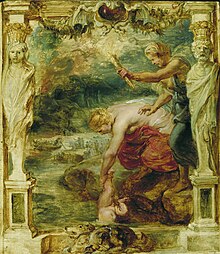
As is recounted in the Argonautica, written by the Hellenistic poet Apollonius of Rhodes, Thetis, in an attempt to make her son Achilles immortal, would burn away his mortality in a fire at night and during the day, she would anoint the child with ambrosia. When Peleus caught her searing the baby, he let out a cry.
Thetis heard him, and catching up the child threw him screaming to the ground, and she like a breath of wind passed swiftly from the hall as a dream and leapt into the sea, exceeding angry, and thereafter returned never again.
Some myths relate that because she had been interrupted by Peleus, Thetis had not made her son physically invulnerable. His heel, which she was about to burn away when her husband stopped her, had not been protected. (A similar myth of immortalizing a child in fire is seen in the case of Demeter and the infant Demophoon). In a variant of the myth first recounted in the Achilleid, an unfinished epic written between 94–95 AD by the Roman poet Statius, Thetis tried to make Achilles invulnerable by dipping him in the River Styx (one of the five rivers that run through Hades, the realm of the dead). However, the heel by which she held him was not touched by the Styx's waters and failed to be protected.
Peleus gave the boy to Chiron to raise. Prophecy said that the son of Thetis would have either a long but dull life, or a glorious but brief one. When the Trojan War broke out, Thetis was anxious and concealed Achilles, disguised as a girl, at the court of Lycomedes, king of Scyros. Achilles was already famed for his speed and skill in battle. Calchas, a priest of Agamemnon, prophesied the need for the great soldier within their ranks. Odysseus was subsequently sent by Agamemnon to try and find Achilles. Scyros was relatively close to Achilles’ home and Lycomedes was also a known friend of Thetis, so it was one of the first places that Odysseus looked. When Odysseus found that one of the girls at court was not a girl, he came up with a plan. Raising an alarm that they were under attack, Odysseus knew that the young Achilles would instinctively run for his weapons and armour, thereby revealing himself. Seeing that she could no longer prevent her son from realizing his destiny, Thetis then had Hephaestus make a shield and armor.

Iliad and the Trojan War
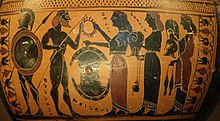
Thetis played a key part in the events of the Trojan War. Beyond the fact that the Judgement of Paris, which kicked off the war, occurred at her wedding to Peleus, Thetis consistently influenced the actions of the Twelve Olympians and her son, Achilles.
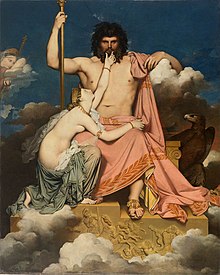
Nine years after the beginning of the Trojan War, Homer's Iliad starts with Agamemnon (king of Mycenae and the commander of the Achaeans) and Achilles (son of Thetis) arguing over Briseis, a woman married to Mynes (son of the king of Lyrnessus). She was kidnapped and enslaved by Achilles. After initially refusing, Achilles relents and gives Briseis to Agamemnon. However, Achilles feels disrespect for having to hand over Briseis and prays to Thetis, his mother, for restitution of his lost honor.[11] She urges Achilles to wait until she speaks with Zeus to rejoin the fighting, and Achilles listens.[12] When she finally speaks to Zeus, Thetis convinces him to do as she bids, and he seals his agreement with her by bowing his head, the strongest oath that he can make.[13]
Following the death of Patroclus, who wore Achilles' armor in the fighting, Thetis comes to Achilles to console him in his grief. She vows to return to him with armor forged by Hephaestus, the blacksmith of the gods, and tells him not to arm himself for battle until he sees her coming back. While Thetis is gone, Achilles is visited by Iris, the messenger of the gods, sent by Hera, who tells him to rejoin the fighting. He refuses, however, citing his mother's words and his promise to her to wait for her return.[14] Thetis, meanwhile, speaks with Hephaestus and begs him to make Achilles armor, which he does. First, he makes for Achilles a splendid shield, and having finished it, makes a breastplate, a helmet, and greaves.[15] When Thetis goes back to Achilles to deliver his new armor, she finds him still upset over Patroclus. Achilles fears that while he is off fighting the Trojans, Patroclus' body will decay and rot. Thetis, however, reassures him and places ambrosia and nectar in Patroclus' nose in order to protect his body against decay.[16]
After Achilles uses his new armor to defeat Hector in battle, he keeps Hector's body to mutilate and humiliate. However, after nine days, the gods call Thetis to Olympus and tell her that she must go to Achilles and pass him a message, that the gods are angry that Hector's body has not been returned. She does as she is bid, and convinces Achilles to return the body for ransom, thus avoiding the wrath of the gods.[17]
Worship in Laconia and other places
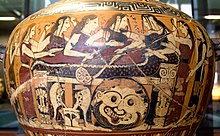
A noted exception to the general observation resulting from the existing historical records, that Thetis was not venerated as a goddess by cult, was in conservative Laconia, where Pausanias was informed that there had been priestesses of Thetis in archaic times, when a cult that was centered on a wooden cult image of Thetis (a xoanon), which preceded the building of the oldest temple; by the intervention of a highly placed woman, her cult had been re-founded with a temple; and in the second century AD she still was being worshipped with utmost reverence. The Lacedaemonians were at war with the Messenians, who had revolted, and their king Anaxander, having invaded Messenia, took as prisoners certain women, and among them Cleo, priestess of Thetis. The wife of Anaxander asked for this Cleo from her husband, and discovering that she had the wooden image of Thetis, she set up the woman Cleo in a temple for the goddess. This Leandris did because of a vision in a dream, but the wooden image of Thetis is guarded in secret.[18]
In one fragmentary hymn[19] by the seventh-century BC Spartan poet Alcman, Thetis appears as a demiurge, beginning her creation with poros (πόρος) "path, track" and tekmor (τέκμωρ) "marker, end-post". Third was skotos (σκότος) "darkness", and then the Sun and the Moon. A close connection has been argued between Thetis and Metis, another shape-shifting sea-power later beloved by Zeus. but prophesied-bound to produce a son greater than his father because of her great strength.[20]
Herodotus noted that the Persians sacrificed to "Thetis" at Cape Sepias. By the process of interpretatio graeca, Herodotus identifies a sea-goddess of another culture (probably Anahita) as the familiar Hellenic "Thetis".[21]

In other works

- Homer's Iliad makes many references to Thetis.
- Euripides's Andromache, 1232–1272.
- Apollonius Rhodius, Argonautica IV, 770–879.
- Bibliotheca 3.13.5.
- Francesco Cavalli's first opera Le nozze di Teti e di Peleo, composed in 1639, concerned the marriage of Thetis and Peleus.
- WH Auden's poem The Shield of Achilles imagines Thetis's witnessing of the forging of Achilles's shield.
- In 1939, HMS Thetis (N25) then a new design of submarine, sank on her trials in the River Mersey shortly after she left the dock in Liverpool. There were 103 people on board and 99 died. The cause of the accident was an inspection hole to allow a sailor to look into the torpedo tubes. A special closure for this inspection hole had been painted over. Once submerged the torpedo tube flooded and the bow of the vessel sank. The stern was still above water. Ninety-nine people, half of them dockyard workers, died of carbon monoxide poisoning.
- In 1981, British actress Maggie Smith portrayed Thetis in the Ray Harryhausen film Clash of the Titans (for which she won a Saturn Award). In the film, she acts as the main antagonist to the hero Perseus for the mistreatment of her son Calibos.
- In 1999, British poet Carol Ann Duffy published The World's Wife poetry collection, which included a poem based on Thetis.
- In 2004, British actress Julie Christie portrayed Thetis in the Wolfgang Petersen film Troy.
- In 2011, American novelist Madeline Miller portrayed Thetis in The Song of Achilles as a harsh and remote deity. She does not approve of Patroclus and tries to separate him and Achilles on multiple occasions.
- The 2018 novel The Silence of the Girls focuses on the character of Briseis in the first person, with interjections giving Achilles' internal state of mind, including his tormented relationship with his mother.
- In 2019, New Zealand graphic designer Rachel Smythe portrayed Thetis in "Lore Olympus". She is Zeus' personal secretary whom she also has an affair with. She is also the toxic best friend of Minthe and works with her to bring down Persephone.
Gallery
Thetis, Peleus and Zeus
-
Thetis on an antique fresco in Pompeii, 1st century
Wedding of Peleus and Thetis
Thetis and Achilles
Notes
- ^ "Nereus: Sea-God, the Old Man of the Sea | Greek mythology, w/ pictures". Theoi.com. Retrieved 2013-05-04.
- ^ Hesiod, Theogony 240 ff.; her mother was Thalassa according to Lucian, Dialog of the Sea Gods, 11, 2."XANTHUS:O Thalassa, take me to you; see how horribly I have been treated; cool my wounds for me.Thalassa: What is this, Xanthus? who has burned you?XANTHUS:Hephaestus. Oh, I am burned to cinders! oh, oh, oh, I boil!Thalassa:What made him use his fire upon you?XANTHUS:Why, it was all that son of your Thetis. He was slaughtering the Phrygians; I tried entreaties, but he went raging on, damming my stream with their bodies; I was so sorry for the poor wretches, I poured down to see if I could make a flood and frighten him off them. But Hephaestus happened to be about, and he must have collected every particle of fire he had in Etna or anywhere else; on he came at me, scorched my elms and tamarisks, baked the poor fishes and eels, made me boil over, and very nearly dried me up altogether. You see what a state I am in with the burns.Thalassa:Indeed you are thick and hot, Xanthus, and no wonder; the dead men's blood accounts for one, and the fire for the other, according to your story. Well, and serve you right; assaulting my grandson, indeed! paying no more respect to the son of a Nereid than that!XANTHUS:Was I not to take compassion on the Phrygians? they are my neighbours.Thalassa:And was Hephaestus not to take compassion on Achilles? He is the son of Thetis."
- ^ A Dictionary of Greek and Roman biography and mythology, Halosydne
- ^ Burkert, The Orientalizing Revolution: Near Eastern Influence on Greek Culture in the Early Archaic Age, 1993, pp 92-93.
- ^ Erwin Rohde calls the isle of Leuke a sonderelysion in Psyche: Seelen Unsterblickkeitsglaube der Grieche (1898) 3:371, noted by Slatkin 1986:4note.
- ^ Pindar, Eighth Isthmian Ode.
- ^ Slatkin 1986:10.
- ^ Ptolemaeus Chennus, New History Book 5, as epitomized by Patriarch Photius in Myriobiblon 190.36
- ^ Ovid:Metamorphoses xi, 221ff.; Sophocles: Troilus, quoted by scholiast on Pindar's Nemean Odes iii. 35; Apollodorus: iii, 13.5; Pindar: Nemean Odes iv .62; Pausanias: v.18.1
- ^ Photius, Bibliotheca 190.46. Translated by John Henry Freese, from the SPCK edition of 1920, now in the public domain, and other brief excerpts from subsequent sections translated by Roger Pearse (from the French translation by Rene Henry, ed. Les Belles Lettres)
- ^ Lattimore, Richmond (2011). The Iliad of Homer. Chicago, IL: University Of Chicago Press. pp. 59–70. ISBN 978-0226470498.
- ^ introduction, Homer ; translated by Robert Fagles; Knox, notes by Bernard (2001). The Iliad ([Repr. with revisions]. ed.). New York, N.Y.: Penguin Books. p. 91. ISBN 0140275363.
{{cite book}}: CS1 maint: multiple names: authors list (link) - ^ introduction, Homer ; translated by Robert Fagles; Knox, notes by Bernard (2001). The Iliad ([Repr. with revisions]. ed.). New York, N.Y.: Penguin Books. p. 95. ISBN 0140275363.
{{cite book}}: CS1 maint: multiple names: authors list (link) - ^ introduction, Homer ; translated by Robert Fagles; Knox, notes by Bernard (2001). The Iliad ([Repr. with revisions]. ed.). New York, N.Y.: Penguin Books. pp. 472–474. ISBN 0140275363.
{{cite book}}: CS1 maint: multiple names: authors list (link) - ^ introduction, Homer ; translated by Robert Fagles; Knox, notes by Bernard (2001). The Iliad ([Repr. with revisions]. ed.). New York, N.Y.: Penguin Books. pp. 480–487. ISBN 0140275363.
{{cite book}}: CS1 maint: multiple names: authors list (link) - ^ introduction, Homer ; translated by Robert Fagles; Knox, notes by Bernard (2001). The Iliad ([Repr. with revisions]. ed.). New York, N.Y.: Penguin Books. p. 489. ISBN 0140275363.
{{cite book}}: CS1 maint: multiple names: authors list (link) - ^ introduction, Homer ; translated by Robert Fagles; Knox, notes by Bernard (2001). The Iliad ([Repr. with revisions]. ed.). New York, N.Y.: Penguin Books. pp. 592–593. ISBN 0140275363.
{{cite book}}: CS1 maint: multiple names: authors list (link) - ^ Pausanias, Description of Greece 3.14.4–5
- ^ The papyrus fragment was found at Oxyrhynchus.
- ^ M. Detienne and J.-P. Vernant, Les Ruses de l'intelligence: la métis des Grecs (Paris, 1974) pp. 127–64, noted in Slatkin 1986:14note.
- ^ Herodotus, Histories 7.191.2.
External links
- THETIS from the Theoi Project
- Slatkin: The Power of Thetis: a seminal work freely available in the University of California Press, eScholarship collection.
- Chisholm, Hugh, ed. (1911). . Encyclopædia Britannica (11th ed.). Cambridge University Press.




